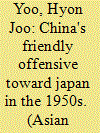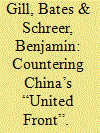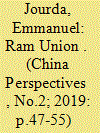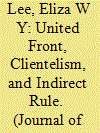|
|
|
Sort Order |
|
|
|
Items / Page
|
|
|
|
|
|
|
| Srl | Item |
| 1 |
ID:
137183


|
|
|
|
|
| Summary/Abstract |
This article explores why the People's Republic of China employed a surprisingly soft and lenient policy toward Japan in the 1950s despite their historical and political animosities. Relying on a relatively new concept in the study of international relations, I argue that China's conciliatory policy toward Japan represented a wedge strategy that was designed to detach Japan from the United States and weaken the US-Japan alliance. The logic of the theory also reveals that China's policy was in line with its “united front” against the United States during the Cold War.
|
|
|
|
|
|
|
|
|
|
|
|
|
|
|
|
| 2 |
ID:
161323


|
|
|
| 3 |
ID:
099672


|
|
|
|
|
| Publication |
2010.
|
| Summary/Abstract |
China's rapid economic development and improvement in living standards have led to a boom in its outbound tourism industry. In 2008, China's outbound tourism expenditure reached USD36.2 billion, ranking fifth in the world. Under the impact of the global economic crisis, outbound tourism is not only a source of revenue to other countries, but also a type of "gift" by China's leaders when they go abroad on official visits. While China is home to an enormous tourist market with high consumption potential, its authoritarian regime and state-owned travel agency have enabled it to exert control over the flow of outbound tourists. These two measures of control have become China's bargaining chip in diplomacy and the work of a "united front". Between 2008 and 2009, China put a damper on outbound travel to Macau and Kaohsiung, Taiwan, validating that its control over outbound tourism is both an economic boost and a threat to other countries.
|
|
|
|
|
|
|
|
|
|
|
|
|
|
|
|
| 4 |
ID:
168016


|
|
|
|
|
| Summary/Abstract |
The Chinese People’s Political Consultative Conference (CPPCC) system is a curious institution: often ridiculed as a decorative “flower vase” for the one-Party regime, or, at best, a networking club meant to appease elite groups, it does not attract much scholarly attention. The Communist Party leadership, however, clings adamantly to what it says is a “broadly representative” intermediary body helping with policy reform and United Front work. In this article, we investigate the validity of this original logic with the help of fresh empirical data. We look at the CPPCC’s institutional history, principles of member selection, delegates’ self-conceptualisation, and their modes of operation. Intermediation, it appears, has always been a blurry task for CPPCC members, resulting in a wide array of behavioural choices – from parroting of the Party line to attempts at proactive agenda setting. After more than two decades of relative openness to innovative bottom-up policy proposals, new rules of unified conduct now again stifle the consultative potential of the CPPCCs – but there seems to be some room for intermediary agency left, especially at the local level.
|
|
|
|
|
|
|
|
|
|
|
|
|
|
|
|
| 5 |
ID:
136293


|
|
|
|
|
| Summary/Abstract |
For a revolution over “culture,” remarkably little has been said about the Cultural Revolution culture itself, and even less about the apolitical, private art produced underground. This article explores this apolitical, private art, arguing that it was a “rebellion of the heart” against the state’s ruthless destruction of the private sphere. Mao’s Party-state drastically fragmented families, moulding socialist subjects through “revolution deep down into the soul.” Paintings of (broken) homes and interiors, flowers, and moonlight articulate lived experiences of the revolution while silently reinventing a private refuge for the body and soul to subsist beyond state control. Defying orthodox revolutionary mass culture, this apolitical art articulated private experience and created a private inner world for a new form of modern subjectivity, while generating community and human solidarity against relentless class struggle and alienation.
|
|
|
|
|
|
|
|
|
|
|
|
|
|
|
|
| 6 |
ID:
162086


|
|
|
|
|
| Summary/Abstract |
This paper discusses Xi Jinping’s policy of religious sinicisation (zhongguohua 中国化) and the subsequent revision of the Regulations on Religious Affairs. I argue that Xi’s fear of foreign influence has driven the direction of recent changes in religious policy in favour of indigenous or indigenised religions. I show that the effort to sinicise religions and the consequent strengthening of the existing regulatory framework risks exacerbating the challenges that the Xi regime seeks to confront in the first place.
|
|
|
|
|
|
|
|
|
|
|
|
|
|
|
|
| 7 |
ID:
168020


|
|
|
|
|
| Summary/Abstract |
The Ram Union is a non-profit social organisation established in 2003 in Zhejiang Province. Its transformation from a local entity into an international NGO tells us about the methods implemented by the Chinese Communist Party (CCP) to accompany the development of popular associations or minjian, which appear to be external to the Party but which in fact are fully sponsored by it. Studying such organisations is a complex matter, as they appear to act in a benevolent and apolitical manner, while being completely integrated within the political and social apparatus of the Party-state (Youth League, volunteers, United Front, ministry of Civil Affairs, etc.). The historical trajectory of the Ram Union thus gives us insight into the CCP’s overlooked strategy of hybridisation, involving mass organisations that came out of the revolutionary period and charitable groups embodying modern Chinese society. This strategy is designed to occupy the social arena and forestall the emergence of an autonomous Chinese civil society in the People’s Republic of China (PRC) or among the Chinese diaspora overseas.
|
|
|
|
|
|
|
|
|
|
|
|
|
|
|
|
| 8 |
ID:
178554


|
|
|
|
|
| Summary/Abstract |
The People’s Republic of China (PRC) is waging a disinformation campaign against the U.S.-led international system. China uses disinformation to translate its economic power into Great Power prestige and to suppress external and internal criticism of the Chinese Communist Party (CCP). Both objectives are intended to bolster the domestic legitimacy of the party and enhance social stability. By linking stability and prestige with economic expansion, the CCP hopes to avoid the ‘Tacitus Trap’ – an existential legitimacy crisis caused by losing the confidence of the people. As a third function, disinformation also obscures Beijing’s efforts to influence and manipulate foreign policies of global actors with respect to China, thus undermining international transparency and the democratic structures and processes of target states. The U.S. response has been ad hoc and reactive, therefore ineffectual.
|
|
|
|
|
|
|
|
|
|
|
|
|
|
|
|
| 9 |
ID:
105828


|
|
|
|
|
| Publication |
2011.
|
| Summary/Abstract |
This paper examines how growing insecurity in Pakistan-affecting the security of Chinese expatriates and neighboring Xinjiang-impacts China's policy towards its 'all-weather' friend. It argues that managing the terrorist risk in a changing regional environment has led to a double adjustment in China's policy towards Pakistan. First, counterterrorist cooperation has moved up the policy agenda, albeit with a peculiar modus operandi, focused on sustaining a pro-Chinese 'United Front' in Pakistan. Second, Beijing has positively reassessed Pakistan's strategic value and moved towards strategic reassurance, although the construction of a trade-and-energy corridor between Gwadar and Xinjiang has been negatively affected by the risk of violence.
|
|
|
|
|
|
|
|
|
|
|
|
|
|
|
|
| 10 |
ID:
173263


|
|
|
|
|
| Summary/Abstract |
United front organizations in Hong Kong have evolved into a form of patron-client network, with the Liaison Office of the Central People’s Government in the Hong Kong Special Administrative Region (Liaison Office) assuming the role of the patron. Possessing the capacity to penetrate into the community and offer patronage goods, these organizations have become the basis for the Liaison Office to build a political machine, discipline elites and maintain their cohesion, control the executive, and counterbalance civil society. The closely knit clientelist network functions as a para-party machinery, supporting the Liaison Office to operate as a quasi-ruling party. On the other hand, immense social resentment has culminated over the Chinese party-state’s (party-state’s) infringement on the autonomy of the Hong Kong Special Administrative Region (HKSAR).
|
|
|
|
|
|
|
|
|
|
|
|
|
|
|
|
|
|
|
|
|